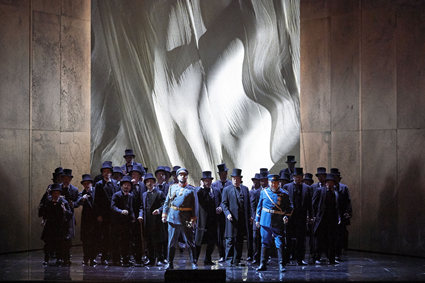| Opera Reviews | 6 May 2024 |
A powerful Otello from Aleksandrs Antonenkoby Moore Parker |
|
| Verdi: Otello
Vienna State Opera 30 June 2019 |
|

General scene
|
|
|
By far outshining Vienna’s past two Otello productions (Peter Wood’s claustrophobic, and Christine Mielitz’ nondescript), Adrian Noble and his team can here claim to present a drama, a tale - updated respectfully, and claiming compactness, power, and credibility - whether one may or may not find the early 20th century prelude to crumbling colonialism and specific format ideal. Essentially simple techniques, materials and a minimum of props transport the action - together with exceptionally creative lighting by Jean Kalman and special effects by Basil Twist (be it the opening storm with its fabulous sails and struggle for salvation on Otello’s vessel, or the eery shadow that Otello casts over Desdemona in their first Act love duet - a silhouette which ominously reappears as Otello enters for Act 4’s tragic finale… to mention but two examples). Enormous copper-plate walls and central structures serve succinctly (if rather anonymously), leaving finely- detailed costumes to establish the setting (Dick Bird). Slick ideas - such as introducing neighbouring barrack beds for Iago and Cassio’s quarters, two enormous candelabra for the grandeur of Act 3, and clusters of candles to dominate the finale and underscore Desdemona’s prayer scene - dispel any sense of monotony. In the title role, Aleksandrs Antonenko brought a towering dimension in stage presence and in vocal capacity to his reading. This is not a “beautifully sung” Otello - but one full of nuance, declamatory power, moments in precarious falsetto - and with stentorian climaxes combined with much fine lyricism - all there, together with certain vocal warts and blemishes. Aspects, such as Otello’s initial chest pains as Iago recounts Cassio’s dream - which then mount as the drama ensues - are compellingly played, and a striking contrast to the apparently powerful physique and smouldering fury in the depiction. His dealings with Iago and Desdemona have been well chartered - and are ultimately, always gripping. This is an artist prepared to take vocal risks - which on this evening (to a large degree) paid off in creating a truly memorable figure, either because - or in spite of - an apparent vocal crisis which has recently caused issues in various international houses. Perhaps this was a lucky evening - at any rate, one to be remembered. On a par - in quite a different sense - was Vladislav Sulimsky’s Iago. Oozing an introverted vanity and lust to weave his insidious web of evil, the debutante in this production can claim a prodigious contribution to the evening - unobtrusively dominant, and scaling Verdi’s score with an ease and dramatic finesse which made him an abstruse - but ideal - foil for this cast’s title lead. Replacing an indisposed Olga Bezsmertna, Elena Guseva (having sung a single performance here of Aida the previous day) bravely accepted the challenge of closing this current season with another single evening of Verdi - testament to the high-ranking stable of artists this house can boast among its resident ensemble. And indeed, this fine singer enjoyed a triumph for a showing which was well-considered, sympathetic, and carefully-paced to suit her capacity. Her instrument is even-scaled but essentially slender in tone - relying upon a good measure of metal to cut through some of Verdi’s heavier orchestration, and currently lacking the ideal weight and bloom to ideally fulfil the task - despite many touching moments. What a pleasure to see Jinxu Xiahou blossoming within the Vienna company - year for year gaining experience and vocal prowess in carefully-chosen challenges which are successively bearing fruit. His Cassio was essentially first-rate - though unfortunately far too inebriated in Act 1 to have been able to rise to the ensuing fencing scene with leaps and bounds between tables and benches. Margarita Gritskova gave an intensely- detailed Emilia, while the remaining supports - Lodovico (Jongmin Park), Roderigo (Leonardo Navarro), and Montano (Manuel Walser) well-filled their niches. The chorus was in feisty form, and well-augmented by an impeccable and sweetly-toned contribution by the Opera School’s juniors in Act 2. This was not Myung-Whun Chung’s evening - appearing vague in concept and structure and tending to flounder in co-ordination - both within the pit, and between pit and stage, and rather lending the impression that any satisfactory passages were realised more by accident than intent. However, in a masterpiece which defies destruction, Verdi survived!
|
|
| Text ©
Moore Parker Photo © Wiener Staatsoper / Michael Pöhn |
|







